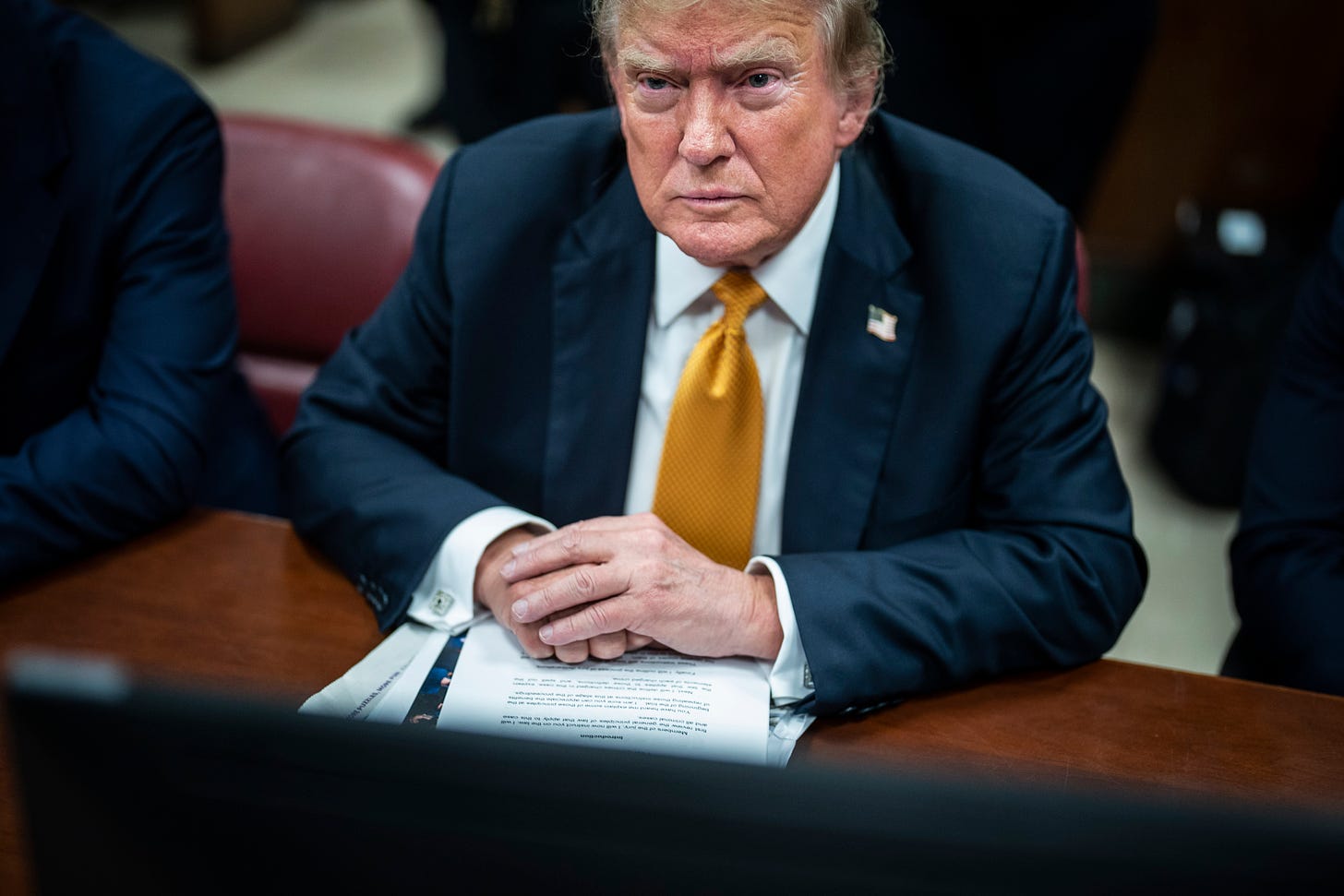

IT IS NOW A LEGAL FACT that Donald Trump criminally falsified business records 34 times to cover up his attempt to hide an extramarital sexual affair. He is a convicted felon.
On its own, this would be one of the biggest scandals in presidential history. Public revelation of an affair with no connection to a crime ended Gary Hart’s presidential campaign in 1987. President Bill Clinton got impeached in 1998 and subsequently disbarred for committing the crime of perjury to cover up his affair with Monica Lewinsky. Trump’s hush-money fraud scandal is at least on par with that, and arguably worse, since his crimes occurred during a presidential campaign, rather than in the middle of a re-elected president’s second term. And that’s before noting that Trump has also been found liable for sexual abuse (and repeated defamation) in separate court proceedings involving a different woman, E. Jean Carroll, also on its own one of the biggest presidential scandals ever.
These scandals look trivial only in comparison to Trump’s even bigger crimes: conspiring to defraud the United States out of its presidential election results in 2020; and stealing, retaining, and exposing high-level national security secrets after leaving office. Trump faces federal charges for both of those, as well as additional state charges in Georgia relating to his post-defeat actions, but none of these cases will conclude, or perhaps even start, before this November’s election.
We get the politics—and the politicians—we deserve. We’re building a community based on good faith, honest analysis, and a commitment to democracy. Join us by becoming a Bulwark+ member. Click below to get a 30-day trial free.
That’s why his Manhattan conviction is such a big deal. Trump is running for president to put himself above the law, and if he wins, it will cause democratic backsliding in the United States like that in Turkey, Hungary, India, and elsewhere. With only accusations and indictments against Trump, less invested voters could chalk it up to the he-said/she-said mudslinging of politics, but a jury conviction makes the stakes clearer. And the news is big enough to penetrate information bubbles, so the sort of voters who pay little attention to politics but end up deciding elections will hear about it.
IT’S WORTH NOTING what didn’t happen.
The trial didn’t turn Trump into some sort of cool outlaw from American folklore.
The charges may have helped Trump in the Republican primary, giving wavering partisans a reason to rally to his defense by playing into his and their victimhood complex. But the theory that the indictments secured Trump the nomination is based on an implausible assumption: that Ron DeSantis was such an appealing candidate that his decline in the polls, which started with the formal launch of his campaign—before Trump’s indictments—must have been due to an outside cause, and not because his candidacy was a political bubble inflated by conservative media, especially anti-anti-Trumpers.
There is no indication so far that this criminal conviction will get anyone to vote for Trump who wasn’t already planning to.
The trial didn’t generate big protests, despite Trump’s calls.
It didn’t cause political violence, despite Trump’s apparent efforts to incite it.
It didn’t result in an acquittal that allowed Trump’s campaign to discredit the legal system (though if Trump were innocent, an acquittal would arguably show the system working).
It didn’t result in a hung jury, with a Trump fan stubbornly refusing to believe the evidence against him, leading to a mistrial and claims that Trump shouldn’t have been charged.
It didn’t even result in mixed verdicts—guilty on some counts but not on others—lending credence to arguments that Manhattan District Attorney Alvin Bragg abused prosecutorial discretion to upcharge Trump with a stretched legal rationale, undermining the case in both court and public opinion.
Nope. Guilty on all counts. Unanimous conviction, including a juror who said he gets his news from X and Truth Social—and they didn’t even need much deliberation.
AS SOON AS THE JURY ANNOUNCED its verdict, Trump, Republicans, and right-wing media began to lie about the trial—of course. They’ve engaged in the absurd doublethink of claiming Trump couldn’t possibly get a fair look from a jury of New Yorkers because everyone there hates him, just a few days after claiming Trump is so loved in New York that his rally in the Bronx had over 25,000 attendees (it was probably a tenth of that). They have attacked the judge, prosecutors, and the judicial system itself. If they can find out their names, they’ll probably attack members of the jury—hopefully just with words.
But the fact of the conviction is too big to deny. In that way, it’s like COVID and the 2020 election. Trump could distort public understanding of what was happening, but his early-2020 lies that COVID was nothing to worry about couldn’t overcome the medical reality. Since leaving office, he’s gotten the Republican party on board with his big election lie—but no matter how many Republicans falsely claim Trump was unfairly cheated, no matter how much fan fiction QAnon conspiracy theorists create, Joe Biden is now president and Donald Trump is not.
Still, Trump will presumably appeal his Manhattan conviction, and there’s almost no chance the legal process will end before the election. Even with the conviction, Trump can legally run for president and Americans can vote for him if they want.
About a fifth of Trump supporters told pollsters earlier this year that their opinion didn’t change with the indictments, but they’d reconsider their support for Trump if he were convicted. But we’ve seen this dance before. In the immediate aftermath of January 6th, a majority of Republicans viewed the insurrection with horror and revulsion—but with Trump and conservative media figures lying and pushing conspiracy theories, most Republicans came around to supporting it, or at least excusing it. They’ll probably abandon their stated principles for Trump yet again.
As a result, despite this guilty verdict, Trump still has a live shot to win presidential power and put himself above the law.
But if Trump loses in November, it will strengthen rule of law, renew faith in institutions, and reinvigorate pro-democracy forces abroad. Without presidential power to protect himself, or the questions of a presidential candidate on trial to complicate the process, his crimes will finally catch up to him.
Criminal justice shouldn’t depend on electoral outcomes. The institutions of American democracy—in particular Congress, the Republican party, and the courts—shouldn’t have let it get this far. But they failed to stop it.
November is effectively an up-or-down referendum on constitutional democracy, boiled down to whether we should put Trump in the White House or jail. Thanks to prosecutors and a jury in New York, there’s a more definitive picture of exactly what Trump is, and what Americans will be choosing to do to the country if they elect him.










